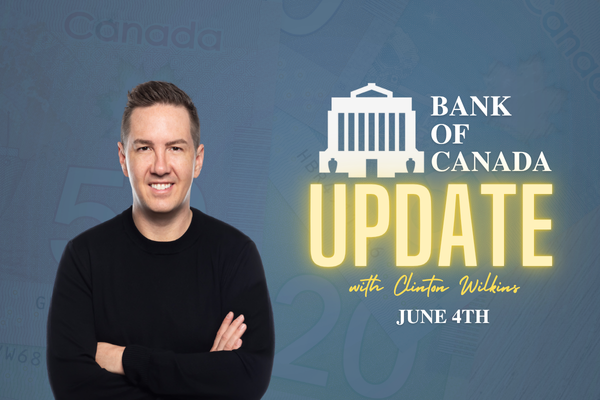Clinton Wilkins joins Todd Veinotte on 95.7 News Radio to discuss The Bank of Canada holding its key policy rate at 2.75%, marking the first pause after seven consecutive cuts.
Rick Howe: How does credit impact getting a mortgage?
How Does Credit Impact Getting a Mortgage? Don’t feel like listening? Check out the audio transcript below.
This is a five minute business builder with Rick Howe, where your business comes first, on News 95.7.
Five-minute business builder with Rick Howe
Rick: [00:00:10] All right. Occasionally on our show we’ll be talking with members of the city’s business community and getting to know who they are and just what they do. And we welcome mortgage broker Clinton Wilkins back. Welcome back to the show this afternoon he’s going to tell us more about credit reports. Hello Clinton, how are you?
Clinton: [00:00:24] I’m wonderful, thanks for having me Rick.
Rick: [00:00:26] Thank you for coming back here today and we’re going to talk about credit reports here today. As a mortgage broker why is credit important? Obviously you’re looking for deals for people and obviously they have to have a pretty good credit rating if they’re going to get a good deal from the banks and such.
Clinton: [00:00:40] Yeah 100 percent, I think the moral of story is the better the credit the better the deal is going to be. Typically, when you’re looking to buy a home, you know, credit is one of the major pillars that we look at in terms of what our clients, you know, really their willingness to pay. It’s looking at their previous credit history around repayment, around utilization, credit inquiries, the mix of the credit that they have and it’s think it’s super super important. And it’s one of those things that the lenders are looking to evaluate each individual client and kind of move forward from there.
Rick: [00:01:12] So if I have a good credit rating chances are I’m going to get a pretty good interest on a mortgage if i’m going to take out a mortgage right?
Clinton: [00:01:21] Yeah 100 percent. The credit score is out of 900 and typically anything over 700 or 720 is considered stellar.
Rick: [00:01:28] OK.
Clinton: [00:01:28] And those people are going to get the very best pricing, as well as maybe the smallest down payments as well.
Credit reports – why is credit important?
Rick: [00:01:33] So how do I check my credit rating? I know there are companies out there that do this kind of job and can I just simply you know pick up the phone and call and get information on my credit rating.
Clinton: [00:01:42] There are two credit reporting agencies in Canada. There’s Equifax and TransUnion and both of them offer credit monitoring. You can also get a copy of your credit report on their Web sites. There are also some free services available out there from some third parties that you can go and have a look at your credit. And I think it’s super important when you’re looking at buying a house, you know, I think checking your credit up front as is definitely super important. But also credit can impact a lot of different things. It can impact employment, your ability to rent, buy cars, obtain you know other unsecured credit as well. So, I think monitoring your credit going forward definitely has a lot of value.
Past issues? What to do
Rick: [00:02:19] But what if I’ve had some issues in regards to you know high credit high interest credit cards those kinds of things.
Clinton: [00:02:26] You know what I think credit issues happen from time to time. You know it can be, you know, loss of employment, health issues, marital breakdown, and credit issues do happen but it’s not forever. When we look at a credit report it’s really a snapshot in time. Typically, what happens is if there is something that’s happened negatively on the credit report it stays on there for six years. So if you miss a payment it will fall off after six years.
Rick: [00:02:50] Because that was my next question. When I was a struggling radio jock back long ago and got into a bit of financial trouble. So that’s that’s been expunged. That past history of mine.
Clinton: [00:03:02] You have been forgiven. And I think that’s why people think you know you know if you’ve had bad credit doesn’t mean that your credit’s bad forever. It’s bad maybe at a snapshot in time and it doesn’t mean that you can’t get a mortgage. If you’ve had some credit issues, you know, there are products available for people that have had some blemishes before. And no matter what their credit mix everyone in Canada can get a mortgage. But you know if there are issues on credit or if there’s issues maybe on income maybe you’re going to need a bigger down payment or the interest rate is going to be higher. You know, obviously the better the situation the better deal you’re going to get.
Credit monitoring
Rick: [00:03:33] You mentioned here credit monitoring. Is that to simply getting a hold of Equifax TransUnion and just hearing and seeing what your credit scores are?
Clinton: [00:03:41] It’s available online, it’s something like a monthly subscription where you would pay a nominal fee and they would send you notifications based on what’s going on with your credit. You can also check your credit for free and any time that you check your credit through TransUnion or Equifax or if you sign up for credit monitoring it does not impact your score.
You know, a lot of people ask me every day, you know, are credit inquiries going to drive down my credit score? I think there’s a little bit of misconception out there around that. The inquiries make up about 10 percent of the actual score, and there is a risk tolerance or a threshold that a certain number of inquiries annually are ok. So, I think if you check your credit, you know, maybe a couple of times a year so if you’re applying for a mortgage or if you’re applying for a car or a credit card a couple of times a year is ok, but if you start checking it a couple times a month that’s going to drive down your score.
You know, the biggest thing that impacts your credit is really around your repayment history and around your utilization. So, for example if you have a credit card with a five thousand dollar limit and you’re at 5000 or, you know, even if you’re over the limit that’s really going to start driving your score down. Usually, we say the rule of thumb is keeping any of your revolving debt below 50 percent of the limit and you’ll be good to go.
Rick: [00:04:53] Excellent. Good advice and it’s a simple thing to do just you can go online, call them, and get your score and that’ll have determined a lot as to getting a mortgage and such.
More questions – contact us!
Clinton: [00:05:04] 100 percent. And if anybody has any questions feel free to reach out to us!
Rick: [00:05:07] Is there a web site they can go to?
Clinton: [00:05:09] Yeah, they can visit us online at www.teamclinton.ca
Rick: [00:05:13] All right. Clinton, appreciate your dropping by here today. Thank you very much!
Clinton: [00:05:16] Thanks for having me Rick!
Rick: [00:05:17] That’s Clinton Wilkins.
[00:05:20] The news 95.7 5-minute business builder with Rick Howe, where success matters.


